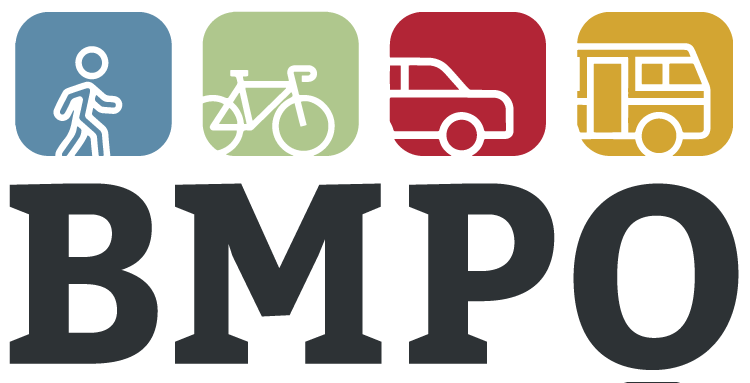
BMPO Partners
Idaho Falls Community Pathways (IFCP) is an organization devoted to promoting non-motorized transportation in Idaho Falls. IFCP’s mission is to promote and improve walking, cycling and other forms of people-powered transportation in the Idaho Falls area. The term ‘pathways’ in the name refers to any route pedestrians, cyclists and other non-motorized travelers use to reach their destinations, such as sidewalks, crosswalks, multi-use paths, pedestrian bridges, and roadways shared with automobiles. IFCP believes that communities can successfully meet the transportation needs of all residents, whether they be motorists, recreational pedestrians and cyclists or those who walk or bike as their primary means of transportation.
Federal Transit Administration (FTA) supports transportation planners and the transportation planning practice. FTA administers metropolitan planning and statewide planning grant programs to help fund the multimodal transportation planning efforts of metropolitan planning organizations and state departments of transportation. FTA may also be used by grantees to support their planning needs. FTA also provides technical assistance on a broad range of planning topics including regional and statewide planning and programming.
Federal Highways Administration (FHWA) is charged with the broad responsibility of ensuring that America’s roads and highways continue to be the safest and most technologically up-to-date. Although S tate, local, and tribal governments own most of the Nation’s highways, FHWA provides financial and technical support to them for constructing, improving, and preserving America’s highway system. FHWA’s annual budget of more than $30 billion is funded by fuel and motor vehicle excise taxes. The budget is primarily divided between two programs: Federal-aid funding to State and local governments; and Federal Lands Highways funding for national parks, national forests, Indian lands, and other land under Federal stewardship.
The Federal-aid Highway Program provides Federal financial resources and technical assistance to State and local governments for constructing, preserving, and improving the National Highway System, a 163,000+ (163,752 actual) mile network of roads, comprising only 4 percent of the nation’s total road mileage, but carrying approximately 45 percent of the Nation’s highway traffic. The program also provides resources for one million additional miles of urban and rural roads that are not on the System, but that are eligible for Federal-aid.
Safe Routes to School In 2005, the federal government created Safe Routes to School (SR2S). The program provides federal reimbursement for local initiatives that make bicycling and walking to school a safer, more appealing option for kids. It is based on five simple concepts: education, encouragement, enforcement, engineering and evaluation.
Today, fewer than 15 percent of children travel to school by non-motorized transportation, while 30 years ago almost 66 percent of children walked or bicycled to school. This decline has added to traffic congestion, poor air quality and the deterioration of children’s health.
International Walk to School is more than just getting together with children and going for a walk to school as a special event. This is certainly important, but the event’s greater aim is to bring permanent change in communities across the globe. A few of its goals are to:
Encourage physical activity by teaching children the skills to walk safely, how to identify safe routes to school, and the benefits of walking;
Raise concern for the environment;
Reduce crime and take back neighborhoods for people on foot;
Reduce traffic congestion, pollution, and speed near schools and;
Share valuable time with local community leaders, parents, and children.
Local programs are encouraged to register school events on www.walkbiketoschool.org.
Traffic Safety Committee addresses specific traffic safety concerns and is comprised of voting and nonvoting members from various local and state agencies and organizations within the community. Traffic safety issues are submitted to the Idaho Falls Chief of Police for consideration. Issues to be addressed in upcoming Traffic Safety Committee meetings will be posted on the City’s web site idahofallsidaho.gov and in City Hall. Meetings are held on the second Tuesday of every month except when no agenda items have been scheduled.
Teton Valley Trails and Pathways, Inc. (TVTAP)
Teton Valley Trails and Pathways promotes a trails and pathways connected community.
Tim Adams, Executive Director
P.O. Box 373 (mail)
60 East Ashley (office/shipping)
Driggs, ID 83422
(208) 201-1622
http://www.tvtap.org/
Rideshare Online
Rideshareonline.com is a convenient and easy to use tool for the traveling public to help reduce traffic congestion, improve air quality and sustain the quality of living in the area. Employers, commuters, event-goers and parents of school-aged children will all benefit from the service. The web site provides free information on travel options and incentive programs for commute and non-commute trips. It also offers tools for employers to implement effective commute reduction programs.
Bonneville Transportation Committee
Regularly scheduled meetings of the Bonneville Transportation Committee are hosted by Idaho Transportation Department District 6 staff. Meetings are held several times throughout the year to inform the public of updates on highway projects in the planning and design phases. Meetings are held at the Commissioners Hearing Room of the Bonneville County Courthouse, 605 N. Capital, Idaho Falls, Idaho. For more information, contact:
Bruce King – Public Affairs
Bruce.King@itd.idaho.gov
208-745-7781
206 N. Yellowstone Ave.
P.O. Box 97
Rigby, Idaho 83442-0097



